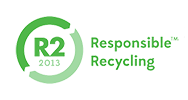Top 5 Ways to Dispose of Computers in New Jersey
Businesses, manufacturers, non-profits, charities, libraries, educational facilities, organizations, consumers, and government agencies have a variety of choices when it comes time to dispose of computers in New Jersey. In some instances, the amount of equipment, the age, the equipment type, and the level of data security required will determine who to contact.
New Jersey has one of the most restrictive computer recycling regulations in the US. The NJ DEP along with 7 other state environmental regulatory agencies have classified discarded computer equipment as a “Universal Waste”, which has regulated waste disposal handling requirements. Under these handling guidelines, only properly registered “Universal Waste Destination Facilities” are permitted to process (recycle) a universal waste. The NJ DEP identifies NJ based computer recycling destination facilities as Class D Universal Waste Consumer Electronics permitted facilities. Class D facilities are authorized to recycle computers as required under the 2011 enacted NJ E-waste law. Only a NJ Class D licensed facility can issue a regulatory valid computer recycling environmental compliance certificate.
In New Jersey, the e-waste law requires that all computers, hard drives, and other electronic equipment must be recycled by a licensed electronic recycler if they are being discarded. For New Jersey businesses, that means an NJ DEP Class D licensed recycler. Regulations require that businesses that are handling or storing more than 11,000 pounds of universal waste (like electronic equipment) must register with both the Federal EPA and NJ DEP as a “Large Quantity Universal Waste Handler”. Handlers are specifically prohibited from processing (recycling) electronic devices. Most registered handlers are used computer resellers and can not issue a regulatory valid computer recycling certificate as required under the NJ e-waste law.
But… the good news is you have some really great options when you want to dispose of computers in New Jersey. We’ve put together a list of some top choices for businesses and households looking to get rid of their computer equipment and electronic devices. Whether you need to destroy your hard drives, recycle your PCs, dispose of a single laptop, or you want to donate an item to a worthy cause, here are our top recommendations:
1.
Back Thru The Future (www.backthruthefuture.com) – Back Thru The Future provides companies, manufacturers, and organization a unique blend of electronic recycling credentials and hard drive shredding experience and capabilities unmatched by any other company in the secure data destruction industry. They are a fully licensed and secure facility with a NJDEP Class D license, NAID AAA, R2, and certified Women Owned Small Business. They are a federal and state registered “Universal Waste Consumer Electronics Destination Facility”.
Back Thru the Future provides secure data destruction, computer recycling, onsite or offsite drive shredding, onsite asset inventory validation, solid state storage destruction, data center relocation and closure services, and medical device destruction. When it’s time to dispose of computers in New Jersey, Back Thru The Future is your best option.
State of New Jersey Department of Environmental Protection E-Cycle Program – This program offers free e-waste recycling for consumers and small businesses of less than 50 full time employees. Eligible items, such as computers, monitors, laptops, portable computers, desktop printers, fax machines, and televisions, can be brought to an approved manufacturers collection site. Call 1-866-DEPKNOW for more information.
County Municipal Utilities Authority – New Jersey residents can contact their Municipal Utilities Authority to learn more about their individual electronic waste recycling program. Number of items and weight limits may apply.
Computers With Causes – If you have a working computer less than three years old and would like to donate it, contact Computers With Causes. Your donations are tax deductible.
AnythingIT – AnythingIT is a US owned and operated, fully certified and compliant electronics recycler that was the first company to be awarded a GSA Schedule 70 Contract for IT Asset Disposition Services (ITAD) leveraging the exchange sale regulation. They ensure environmental compliance, data security, and the overall best value to the Government for recovery values.
Tips for donating electronics:
- The typical lifespan of a computer is around seven to eight years. If your computer or tablet is less than eight years old and still working, extending the life through re-use provides a high environmental benefit and can help a student, a veteran, or someone returning to the workforce that couldn’t otherwise afford one.
- Don’t donate your equipment directly to a school or charity, as they may have specific equipment needs and requirements. Also, most are not equipped to store donated devices and your computer may need to be cleaned of all data and software may need to be updated.
- Do include things like documentation, software, and accessories like the keyboard, mouse, printer, and monitor.If you prefer to dispose of your electronic devices, call the program, municipality, or donation site to confirm that they will accept your devices. Some programs charge a fee to accept equipment and not all of them will erase your information so be sure to ask what their policy is and their credentials.

Businesses that prefer not to donate (either because their equipment is too old, not working, or needs to be destroyed for data security reasons), should look for the Responsible Recycler (R2) certification, which requires that recyclers meet very specific and strict standards for safe and responsible recycling. These standards regulate environmental safety, worker safety, and data security. Your recycler should supply you with a certificate of destruction or recycling, should be a NJ DEP Class D computer recycler, NAID AAA certified, ISO certified, and be a US EPA and NJ DEP licensed “Universal Waste Destination Facility” for the processing of electronics.
Whatever you decide to do with your computer equipment, make sure you are handing to a secure facility and that your sensitive information is safe. Ask for credentials, licenses, and do some research on the company’s history.
